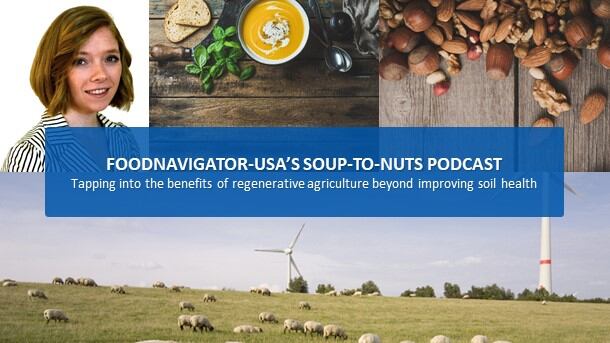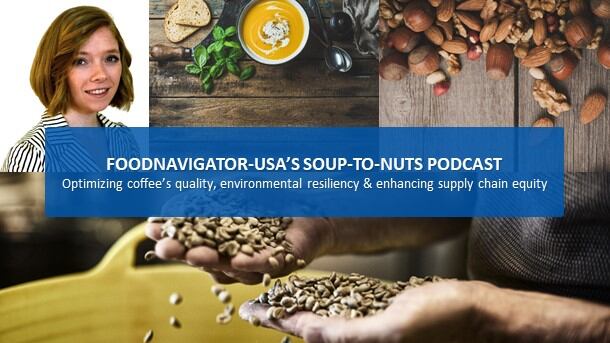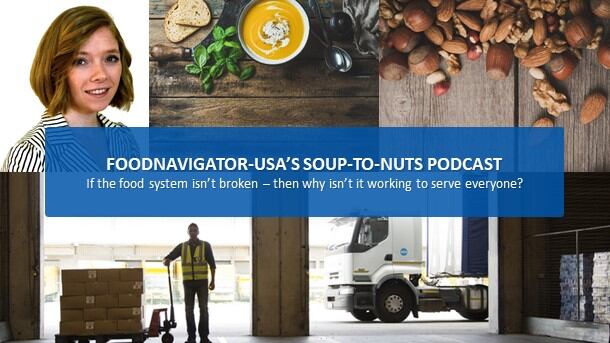For example, it argues, regenerative agriculture systems also have the potential to ease many of the social challenges that threaten the safety and security of people globally, including longstanding inequalities.
To fully seize the potential of regenerative agriculture and further drive still-limited adoption, Forum for the Future is inviting stakeholders from across the value system, including farmers, agribusinesses, food service, retailers, manufacturers and others, to join its ambitious Growing our Future initiative, which over the last year with funding from the Walmart Foundation has identified four “leverage” points, including policy change, pathways to market, regional pilots and financing the transition.
In this episode of FoodNavigator-USA’s Soup-To-Nuts podcast, Mary McCarthy, the program lead for the initiative, shares how regenerative agriculture can improve not only the environment but social equity and public health as well. She also shares how Forum for the Future is working with stakeholders to overcome three main challenges to the adoption of regenerative agriculture, including policy changes, financing and creating pathways to market. Finally, she shares a starting point for stakeholders that recognizes the enormity of the challenges the agriculture and food industries are facing but also offers grace and flexibility depending on where players are in adoption journey and their available resources.
[Editor’s Note: Never miss an episode of FoodNavigator-USA’s Soup-To-Nuts podcast – subscribe today.]
Leveraging agriculture as a solution to environmental challenges
For the past 25-years, Forum for the Future has focused on accelerating the transition to a just and regenerative future by identifying and cultivating systemic approaches to some of the most critical challenges facing our world today, including climate change and social equity.
According to McCarthy, agriculture and the food system lay at the heart of these challenges – both as causes, but also solutions.
“Regenerative agriculture … is drawing in prominence because of this recognition of the contribution that our agriculture system has to some of these really pressing and urgent global crises that we have,” she explained.
On the environmental side, mainstream agriculture’s environmental costs reach nearly $85b annually, including soil erosion and a contribution of 8%-10% of green house gas emissions coming from farming, she explained. It also is creating pressure around water and soil quality and biodiversity.
At the same time, McCarthy argued, “there is a real opportunity for agriculture to provide the solution. Soil is a natural place to store and sequester carbon and while we continue to look for technologies and solutions that can address the climate crisis, plants do that naturally. They naturally sequester carbon for us,” and strategic farming practices can leverage that.
On the social side, McCarthy explains that regenerative agriculture can alleviate extreme pressures on farmers by advocating for the use of cover crops and increased biodiversity, which could provide additional revenue streams.
This diversity also could help ease food insecurity by providing more nutrient dense options at a local level and help connect consumers to farmers, she said.
As consumers learn more about regenerative agriculture, they can make more strategic purchases that ensure a greater portion of their dollar is more evenly distributed along the value chain – helping to drive equity, McCarthy added.
Three main challenges
To achieve the full environmental and social benefits offered by regenerative agriculture, Forum for the Future’s Growing our Future initiative has identified three significant hurdles that stakeholders across the value chain will need to address together.
“The first one is policy,” and how can legislation like the Farm Bill be leveraged to encourage regenerative outcomes and reshape how stakeholders measure success, McCarthy said. She explained that the initiative is working with existing policy groups to educate stakeholders about the value of regenerative agriculture for the upcoming 2023 Farm Bill.
The second is financing the transition and providing economic relief and stability to farmers to help them adopt what can be expensive changes to their business practices.
“Farmers face this chasm of uncertainty as they try to make this transition and they actually require different types of financial support and financial tools and mechanisms at different points in that transition. And so we’re really trying to think about how do we start to bring together those different tools and financial mechanisms at different points in that journey,” McCarthy said.
The third challenge is creating pathways to market, so guarantees from food manufacturers for rotational crops, for example, McCarthy said.
A call to action for food manufacturers, farmers and consumers
While many of these challenges originate or focus on the farm-level, McCarthy notes the brunt of finding and executive solutions cannot fall on the farming community – rather, food manufacturers and retailers will need to do much of the heavy lifting to successfully execute change at a scale and speed that is impactful.
The first step is to make a clear commitment – recognizing that there is a steep learning curve and that everyone is at different places in the adoption cycle, McCarthy said. With this in mind, she said, commitments can range from pilots to large scale change, but the most need changes are mid-level.
For example, this could include commitments at a regional level or related to one brand or a handful of SKUs rather than a full-scale commitment across a line or entire company.
Just because most of the heavy lifting will fall to brands and retailers, doesn’t mean farmers are off the hook. McCarthy also calls on them to be open-minded to change and embrace partnerships that will manifest that change.
Finally, McCarthy calls on consumers to educate themselves on where their products come from, how they are made and to use their dollars to support companies investing in regenerative agriculture.
Get involved
Recognizing that change of this magnitude is hard and will take time, Forum for the Future’s Growing our Future initiative has laid out a detailed strategy for the next three years in a report available on its website www.forumforthefuture.org/scaling-regenerative-agriculture-in-the-us. There readers can also find out how to get involved – no matter where they are in adopti




